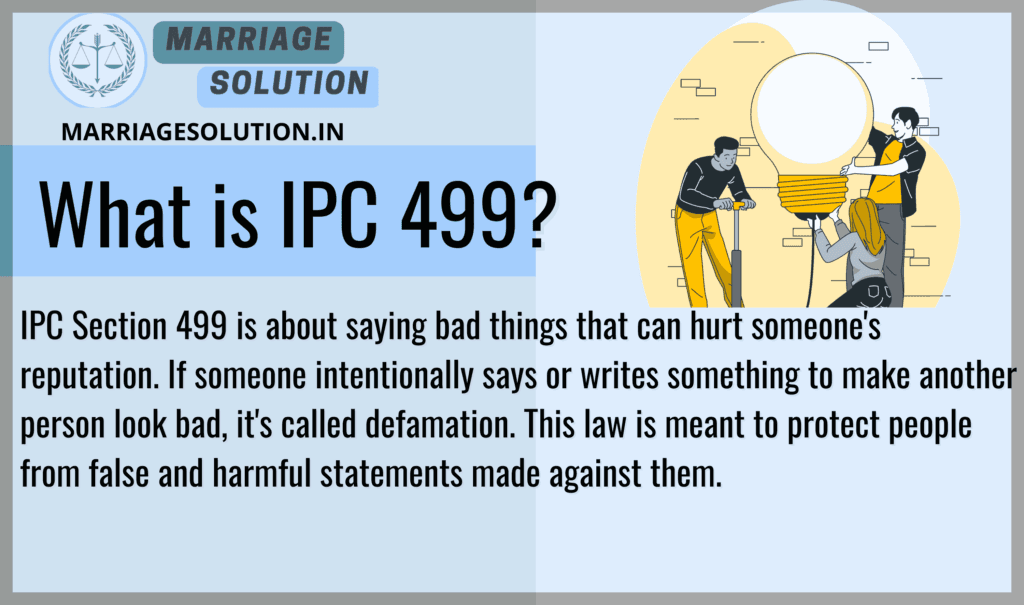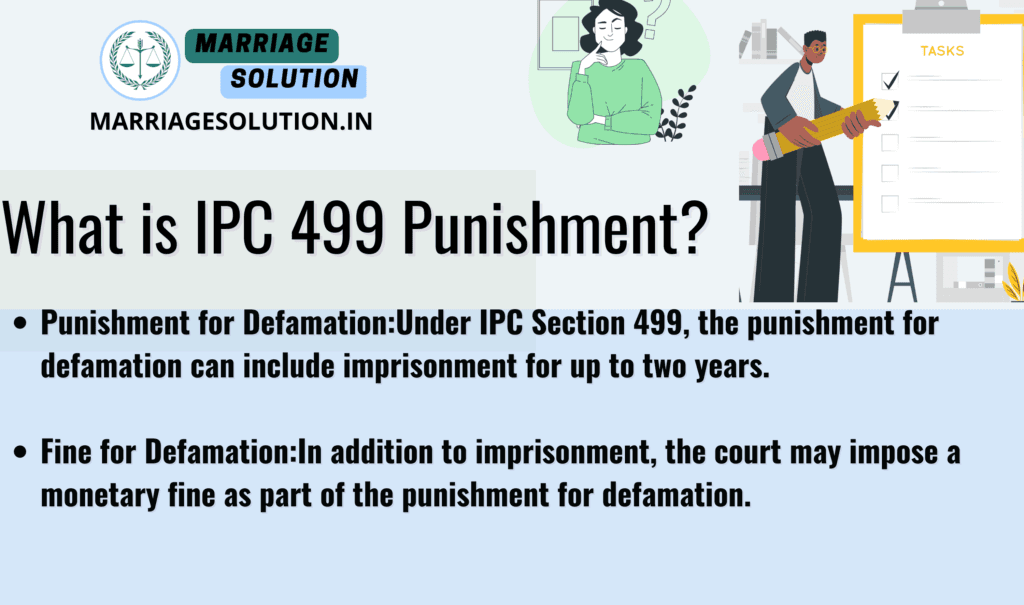Introduction of IPC Section 499
IPC Section 499 is a part of the Indian Penal Code that deals with defamation. Defamation means saying or writing something that damages someone’s reputation. This law aims to protect individuals from false accusations and harmful statements made against them.
- Introduction of IPC Section 499
- What is IPC Section 499 ?
- IPC Section 499 Overview
- 499 IPC Punishment
- 499 IPC bailable or non bailable ?
- Section 499 IPC in short information
- Section 499 and 500 of IPC
- IPC Section 499 FAQs
- If you need support with court proceedings or any other legal matters, don’t hesitate to reach out for assistance.
What is IPC Section 499 ?
IPC Section 499 is about saying bad things that can hurt someone’s reputation. If someone intentionally says or writes something to make another person look bad, it’s called defamation. This law is meant to protect people from false and harmful statements made against them.

IPC Section 499 Overview
IPC Section 499 addresses the offense of defamation, which involves making false statements that harm someone’s reputation. Defamation can occur through spoken words, written words, signs, or visible representations. The person making the defamatory statement must either intend to harm the reputation of another person or know that their statement will cause harm.
Key Points of IPC Section 499 (Defamation)
- The Defamatory Act
- Key Point Name: Defamatory Statements
- This section deals with making or publishing statements that can harm someone’s reputation.
- Modes of Defamation
- Key Point Name: Ways of Defamation
- Defamation can occur through spoken words, written words (intended to be read), signs, or visible representations.
- Intention or Knowledge
- Key Point Name: Intent to Harm
- The person making the defamatory statement must either intend to harm the reputation of another person or know that their statement will harm the person’s reputation.
- Punishment
- Key Point Name: Defamation Penalties
- The punishment for defamation under IPC Section 499 can include imprisonment for up to two years, a fine, or both.
- Bailability
- Key Point Name: Bailability of the Offense
- Defamation under IPC Section 499 is a non-cognizable and bailable offense, meaning the accused has the right to seek bail.
- Protection of Reputation
- Key Point Name: Reputation Protection
- This law aims to protect individuals from false or malicious statements that could damage their reputation in society.
499 IPC Punishment
- Punishment for Defamation:
- Under IPC Section 499, the punishment for defamation can include imprisonment for up to two years.
- Fine for Defamation:
- In addition to imprisonment, the court may impose a monetary fine as part of the punishment for defamation.

499 IPC bailable or non bailable ?
IPC Section 499 (Defamation) is a non-cognizable and bailable offense. This means that if someone is accused of defamation under IPC Section 499, they have the right to seek bail as a matter of right. Non-cognizable offenses are those where the police cannot arrest the accused without a warrant from the court, and bailable offenses allow the accused to be released on bail while awaiting trial. Therefore, if someone is charged with defamation under IPC Section 499, they can seek bail during the legal proceedings.
Section 499 IPC in short information
| Aspect | Explanation |
|---|---|
| Definition | IPC Section 499 deals with defamation, which means saying something false to harm someone’s reputation. |
| Offense | The offense involves making false statements about someone that can damage their reputation. |
| Punishment | The punishment for defamation under IPC Section 499 can be imprisonment for up to two years, a fine, or both. |
| Bailable | IPC Section 499 is a bailable offense, meaning the accused can seek bail while awaiting trial. |
Section 499 and 500 of IPC
| Aspect | IPC Section 499 | IPC Section 500 |
|---|---|---|
| Definition | Making or publishing false imputations with the intention to harm someone’s reputation or knowing it will harm. | Specifies the punishment for defamation under IPC Section 499. |
| Offense | Involves making false statements or imputations that damage an individual’s reputation. | Outlines the specific punishment for the offense of defamation. |
| Punishment | Imprisonment for up to two years, fine, or both. | Imprisonment for up to two years, fine, or both (aligned with Section 499). |
| Bailability | Bailable offense – Accused can seek bail during legal proceedings. | Bailable offense – Accused can seek bail during legal proceedings. |
IPC Section 499 FAQs
What is the essence of the offense under IPC 499?
The essence of the offense under IPC 499 is making or publishing any imputation (statement or accusation) that can harm the reputation of a person, either intentionally or with knowledge or reason to believe that it will harm the person’s reputation.
What is the maximum punishment for the offense under IPC 499?
The maximum punishment for the offense of defamation under IPC 499 is simple imprisonment for a term which may extend to two years, or a fine, or both.
Is the offense under IPC 499 bailable?
Yes, the offense under IPC 499 is non-cognizable and bailable, which means that the accused can claim the right to be released on bail as a matter of right.
If you need support with court proceedings or any other legal matters, don’t hesitate to reach out for assistance.
Court or any other marriage-related issues, our https://marriagesolution.in/lawyer-help-1/ website may prove helpful. By completing our enquiry form and submitting it online, we can provide customized guidance to navigate through the process effectively. Don’t hesitate to contact us for personalized solutions; we are here to assist you whenever necessary!
